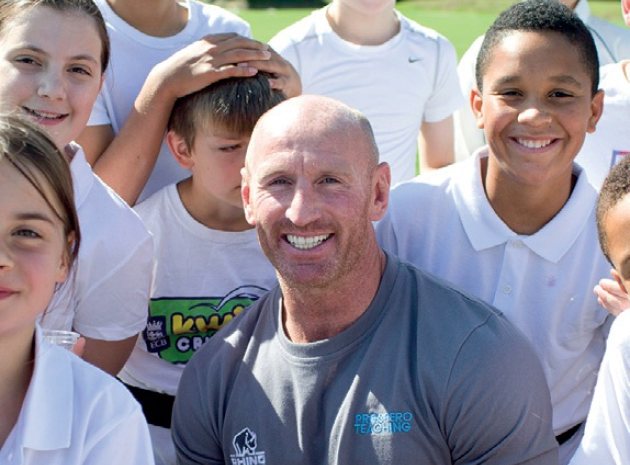Victims of bullying come in all shapes and sizes, including sporting heroes - as Gareth Thomas knows only too well…
For me the overwhelming memory of secondary school is simply how I couldn’t wait to leave. I’d been happy at primary school and by the time I left, had a bit of a reputation on the rugby pitch – which was a big deal in the area I’m from, where the sport runs through people’s veins. I’d even represented the district, which was amazing. It meant that teachers and kids knew who I was and even admired me a bit, I suppose. But then of course you start Year 7, and you’re suddenly thrown in with all the ‘stars’ from the other schools in the area, and the battle for supremacy, if you like, starts again. It’s a difficult transition as a child, especially as you’re not just integrating with your year group – you’re surrounded by 14,15, 16-year-olds, and that can be a bit scary and intimidating. You have new teacher, new systems, GCSEs looming… it’s a lot to cope with.
It didn’t help that I struggled academically. I enjoy learning, but I need to be taught in a certain way. I’d been eager at primary school, but I had a really short attention span and found concentrating difficult; I soon fell behind. The idea of different learning styles wasn’t talked about back then, but I know now that I learn best through doing – I wish I could have been a part of things in lessons, rather than having to sit still and listen to someone explaining concepts to me.
On top of that, I’m the youngest of three brothers. The middle one is very smart and was in the year above me at school. So, right from the start in every lesson I’d hear, “you’re not as good as your brother”, or “why can’t you be more like Richard?” I remember my mum at parents’ evening, telling my teachers in frustration, “he can’t be like Richard… because he’s not Richard!” She was good like that.
Luckily, I think my year group was one of the worst, academically speaking, the school had ever had – so at least I didn’t stand out too much. And with learning going so badly, sport became more important than ever. That’s where I found my friends; my place. As part of the rugby team I had an automatic, built-in bunch of mates, and social standing too. But the flip-side of that is that there are expectations on you to act a certain way, and be a certain type of person. If you’re a little bit different, then the implication is that perhaps you should be in with a different group of people, regardless of your ability. I knew I was different. And it scared me – I felt like if I didn’t fit in, then I would lose everything. So I watched, and learnt. I worked out which girls I should say I liked, and which I shouldn’t. What to say, and how to say it. I was an actor.
Then, when I was about 12 or 13, the bullying started. It was little things at first – name calling. But I allowed it to happen, I didn’t stand up to it. I was afraid of being ‘found out’. The name calling got worse; I’d be flicked with towels in the changing rooms – spat on, even. When I look back now, as an adult, I remember it so vividly. But I didn’t want to tell anyone. I can still recall the embarrassment, and the fear that if I told, I’d be bullied even more.
Eventually, though, I woke up one morning and realised I’d had enough. I told mum I had a stomach ache, but she knew I was faking (although not why), and insisted I had to go to school. I was walking down the street in front of her, and suddenly started crying. She saw my shoulders shaking, asked what was wrong – and I told her everything. It was hard, but a relief to get it out. She spoke to my teachers – they spoke to the rugby boys, and it ended that day. I didn’t think it could be over that quickly after so long. I wish there had been someone there I could trust and speak to about it earlier – I mean, there probably was, I just didn’t know. I needed a safe point of call.
That’s why I’ve got involved with the Balls2Bullying campaign, going into schools and talking to kids directly about my experiences, letting them know that they don’t have to keep things to themselves, whether it’s bullying, or issues with their sexuality, or anything else. I hope that we can help children at a young age, so they don’t need more serious intervention later on; so that any issues they have can be faced and dealt with before they risk going into that dark, secret web of lies that can be waiting for them in their adult life if they feel forced to keep their true selves hidden.










